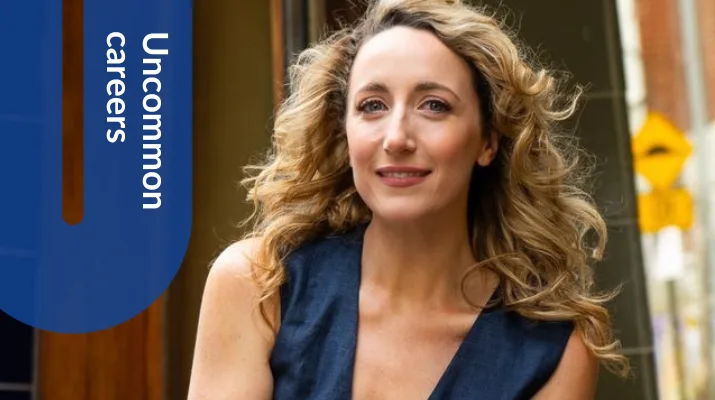What is a Bachelor of Arts?
By Open Universities Australia
It’s the OG of all bachelor degrees and continues to inspire high regard for the sharp, considered and versatile graduates it produces.
Why ‘arts’ when it doesn’t include visual art classes?
Good question—one that can only be answered by examining the Latin word from which it originates. So, ‘arts’ comes from the Latin ‘ars’, meaning either ‘art’ (creative expression across any kind of media) or ‘principled practice’ (there’s the definition we were looking for).
In the original incarnation of a university education, dating back to classical antiquity, students studied a group of subjects called the artes liberalis, which encompassed rhetoric, grammar, logic, astronomy, arithmetic, geometry and music.
According to the University of Warwick, artes liberalis itself means ‘the knowledge worthy of a free person’. In other words, the knowledge and skills that would make you a critical thinker.
Since then, the mix of subjects has undergone many changes, and now generally includes all the social sciences, creative arts and humanities. In traditional universities such as Cambridge and Oxford, every undergraduate student is awarded the Bachelor of Arts, even the ones studying the natural and formal sciences.
What exactly do you study in a Bachelor of Arts?
A Bachelor of Arts is purposely designed to broaden your horizons while sharpening your analytical mind. You’ll choose a major (a central topic that interests you) from a tantalisingly diverse list of options.
For example, in La Trobe University’s Bachelor of Arts offered through Open Universities Australia, the majors offered include everything from archaeological studies to creative writing, linguistics to sociology, and visual cultures to politics. You’ll typically have to study 8 units within an interest area to earn your major.
Apart from your major, you’ll usually have to complete another 12 units. And because a Bachelor of Arts is all about flexibility and choice, you get to decide how you want to ‘spend’ them. You could
do a second major plus a minor
complete a minor plus a bunch of electives; or
simply take a wide variety of electives.
Note—you earn a minor when you complete 4 units within an interest area. At some universities, your minor and electives can come from any department across the university, no matter how obscure (agriculture, anyone?).
What is the ATAR score for a Bachelor of Arts?
ATAR entry scores for the Bachelor of Arts will vary across universities. Broadly speaking, you’ll need an ATAR of at least 60 to get into most.
Interestingly, some inclusive institutions will waive the need for an ATAR. If you’re thinking about studying online through Open Universities Australia, you can get started even if you don’t have a high enough ATAR—or any ATAR at all. Find out more about this by reaching out to one of our friendly student advisors.
Is a Bachelor of Arts worth it?
Just ask Barack Obama. He studied a Bachelor of Arts at Columbia University, majoring in political science and specialising (read—minoring) in international relations as well as English literature. See what we mean about arts degrees being flexible and diverse?
After that, he worked as a financial researcher and writer, community organiser and instructor before heading to law school and teaching law while working as a civil rights attorney. He was also a senator for three years before taking on that somewhat big job of being president of the USA.
Related reading: Is it possible to make a career in the arts?
Whether or not you become our next prime minister, a Bachelor of Arts will teach you how to think and learn on your feet, solve problems in unexpected ways, make your point logically and persuasively, and write clearly and engagingly.
And since we live in a world where change is the only constant, what better way to prepare yourself for an ever-evolving career and life?
What can you do with a Bachelor of Arts?
So. Many. Things. Here’s a curated, non-exhaustive list, by sector:
Publishing, media and communications
Jobs you could do: Journalist, researcher, copywriter, editor, content producer, communications advisor or book publicist.Politics, government and public service
Jobs you could do: Policy advisor, intelligence analyst, foreign affairs officer or community liaison.Creative arts
Jobs you could do: Gallery manager, writer, curator, administrator or fundraising specialist.Community and international aid and development
_Jobs you could do:_International aid worker, community project officer, disability services coordinator, activist or human rights advocate.Business
Jobs you could do: Public relations specialist, strategic communications advisor, technical writer, marketing content writer or advertising specialist.
Plus many more—you are limited only by your ambition and capacity to learn!
How do I find a Bachelor of Arts course that suits me?
Explore the breadth of units available in every Bachelor of Arts course on your shortlist. Arts-leaning students tend to be voracious learners with wide-ranging interests. So, are the courses you’re considering varied and flexible enough that you can mix and match the subjects you wish to dive into?
If you’re thinking about studying online, Open Universities Australia makes comparing courses easy—just favourite the ones you’re keen on then hit ‘Compare degrees’.
Or, book a free call with a student advisor who can chat you through all your options.
Not sure whether a full degree is right for you? You may be able to start by signing up for a standalone subject—your student advisor will be able to guide you to a unit that suits your interest and potentially gives you credit towards a degree, if you decide to enrol in one later.
There’s no downside to exploring the arts!
View the full range of Bachelor of Arts options taught by leading Australian universities through Open Universities Australia. Or, read more about the smorgasbord of subjects that make up the arts, humanities and social sciences.



